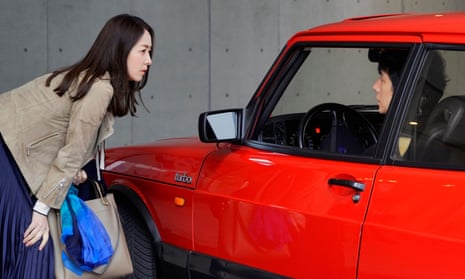A theatre actor mourning the sudden death of his wife and coming to terms with her numerous betrayals forms a bond with the emotionally shuttered young woman who is hired to drive him during a residency in Hiroshima. That’s the core of a sinuous, looping plot, but this beguiling adaptation of a short story by Haruki Murakami is a languid thing that leaves plenty of space around the central relationships to explore the creative process, professional and personal jealousies and guilt. The latter is something that Yûsuke (Hidetoshi Nishijima, superb), who is directing a multilingual production of Uncle Vanya, and his driver, Misaki (Tôko Miura), find that they have in common.
Yûsuke’s cherished car, a glossy red Saab 900 Turbo, is a thing of beauty, but a temperamental beast; Misaki is unfazed by its quirks. Her calm handling of the vehicle impresses Yusuke, as does her discretion. But for all the miles of road they cover together, it’s an even longer journey for either to achieve any kind of healing.
With its eddying, fluid score and judicious use of silence, its satisfying layers of storytelling, this is a supremely confident piece of film-making from Ryûsuke Hamaguchi, albeit one that, at three hours long and with a rather Chekhov-heavy second half, will certainly require the right mindset.

Comments (…)
Sign in or create your Guardian account to join the discussion